According to the UN Environment, over 300 million tonnes of plastic waste is produced every year, with 8 million tonnes ending up in the ocean. Since the 1950s, 60% of plastic made has ended up in landfills and in our natural environment. Even worse, more than half of the plastic produced was intended for single use. While it's up to the large producers of plastic to take accountability and stop creating it, until they do, it's up to us as consumers to purchase mindfully and to limit our use, especially for single-use plastics.
A spark isn't a fire, it's what starts the fire. Just like saying no to a plastic straw won't end plastic use, but it helps start the conversation. And with so many better alternatives available to us, why not go green?
10 Simple Ways to Use Less Plastic!

1. Go Reusable. Carrying a reusable water bottle is one of the best ways to reduce your single-use plastic consumption and it's easy to do. Just one person making the switch to a reusable water bottle saves 170 bottles from being made every year. Plus you don't have to worry about leaching toxins from all of that plastic. Tip: Try opting for fully plastic-free bottles and don't fall for brands that claim they're eco-friendly and then send you bottles wrapped in plastic or have a plastic lid 🙄
Here are a few of our favorites. They are pricier than traditional reusable bottles, but a one-time investment of $20-$40 is worth it if you ask me, especially with companies committed to sustainability and giving back.
- Copper H20. We drink from a copper pitcher at home so when I discovered these reusable copper water bottles, I was thrilled! Not only does the water taste smoother, but it's also great for your health, which is why people in India have been doing this for centuries. Plus, this company donates 15% of its profits to charity. Win-win!
- Jerry Stainless Steel Bottles. If you're looking for a pure steel bottle, then this one's for you. 100% of their profits are donated to support clean water projects around the world :)
- Soul Bottles. Climate neutral, produced in Germany, plastic-free, and fair-trade, these glass bottles come with inspiring messages and donate 1€ to clean drinking water projects from every sale.
- Made by Fressko Glass Bottle. 100% plastic free glass bottle with a bamboo lid. Perfect for carrying tea and infused waters on the go. It's on the pricey side, but I've broken 3 cheaper versions of this already so decided to commit after meeting them in person at one of our events. They're also available in many local stores if you want to save on shipping costs. The only downside for me is that they are not a mission-driven company, and it's not clear if they are committed to sustainability like the brands above.

2. Eat With Bamboo. Americans use 100 million plastic utensils daily—much of which comes wrapped in more plastic—and can take up to 1000 years to decompose. So carrying your own utensils can have a great impact. I highly recommend Bamboo since it is technically a grass and can be cut without killing the plant. It also regrows faster than any wood. I carry a pair in my bag so I don't have to use plastic silverware, including on a plane. Plus, they are heat, stain, and water resistant and also durable. Tip: Make sure to request no utensils when ordering delivery or takeout. I forgot to do this more than I would like to admit and I'm making it a goal for this month!
- Bambu. Made from certified organic and sustainably grown bamboo and packed in organic cotton, hemp, or cork materials.

- Brush with Bamboo. Organic, handmade, compostable packaging, and family-founded.
- Most stores carry bamboo hairbrushes. Just make sure to look for ones that also have bamboo bristles.

4. Carry Your Straws. Did you know before plastic, most drinking straws were made out of straw? It's true! It wasn't until the 1960s that straws were made completely from plastic. While ditching your straw might not save the planet, it's a conscious step in the right direction; a step that often gets those around you to stop and think about their daily actions.
Fortunately, until manufacturers take responsibility and stop producing them, or restaurants stop carrying them, there are a ton of alternatives on the market. I prefer glass, but there are also stainless steel, bamboo, paper, straw, and even pasta straws! Tip: Don't forget to tell your server that you don't want a straw when dining out. It's too late when it's already in your drink.
Here are some recommendations for sustainable straws. Something to keep in mind is packaging. It really irks me when companies tout eco-friendly products and then they ship them in plastic—or worse, styrofoam. These companies are committed to sustainability from start to finish:
- Bamboo
- Brush with Bamboo. Organic and produced without fossil fuels.
- Bambu. Certified B-Corporation committed to sustainability and fair labor practices.
- Glass
- Simply Straws. A little pricey but totally worth supporting this company. They are women-owned, donate a portion of profits to charity, and are completely eco-friendly from packaging, to dyes, to energy used.
- Metal
- Mulled Mind. Handmade to order in the U.S.A. All packaging is biodegradable, reused, or recycled.

5. Pack Smartly. In India, everyone takes their lunch to school or work in steel tiffins. They are easy to clean, last longer than plastic, and also keep food warm, reducing the amount of energy needed to reheat. They even work well for carrying sandwiches and snacks. Here are a bunch of options from Life Without Plastic. Bonus: If you live in San Francisco and are looking for a sustainable meal delivery option, check out Green Tiffin :)
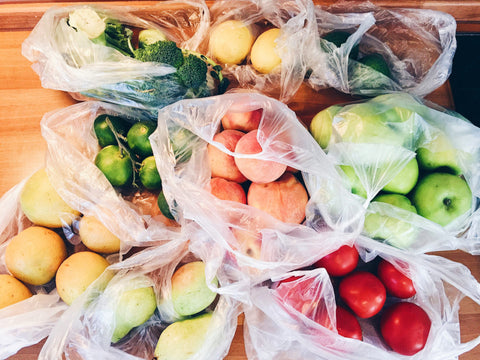
6. Get Produce Bags. 1 to 5 trillion plastic bags are used worldwide every year. 5 trillion is almost 10 million plastic bags a minute! While many of us are already carrying reusable grocery bags or opting for recycled brown bags over plastic, why not take it one step further with reusable produce bags? Not only will this help reduce the amount of plastic bag waste created annually, but it will also keep your produce fresher.
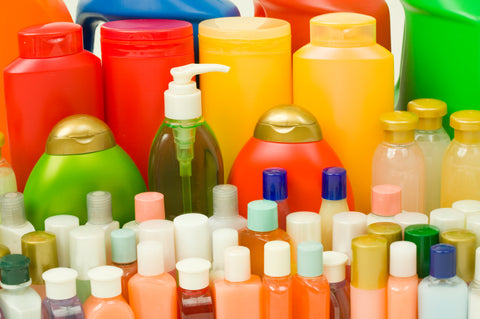
7. Switch to Bar Soap + Shampoo. While body washes and liquid shampoos are convenient, they not only add to our plastic waste problem, but they're also heavier due to their size and water content, which means they have a larger footprint when shipping. Not to mention, they're filled with chemicals and preservatives to prevent them from spoiling.
When you ditch the liquids, you're opting for plastic-free packaging, and usually an organic and preservative free alternative that's much better for your skin and the environment. Tip: If you have to go with liquid, many local grocery stores offer refill options for bulk products and soaps. For my Chicago readers, I recommend Sugar Beet Food Co-Op or Dill Pickle.
For bar soaps, I recommend Chagrin Valley Soap & Salve. Many organic companies still use palm oil, which is one of the leading causes of deforestation.
- Bar Soap. I have super dry skin and eczema, and their Coconut Shea soap has been a lifesaver for my thirsty skin.
- Bar Shampoo. There’s a slight adjustment period, but once you find the right bar for you, it works better than liquid and lasts for months. I recommend getting a few trial sizes before purchasing the full bar so you can see what works best for you.
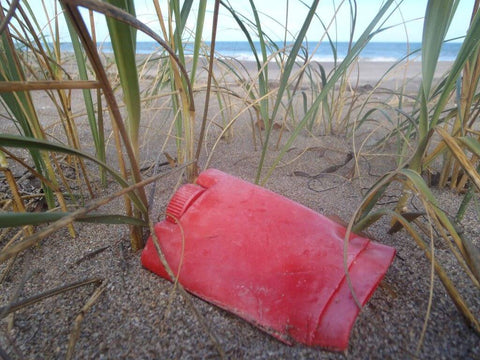
8. Opt for Paste Deodorant. Did you know that most deodorant tubes aren't even recyclable? That's because they're made up of more than one type of plastic. So unless you take your tube apart before tossing it into a blue bin, chances are it's ending up in a landfill. Paste deodorant typically comes in glass jars so you don't even have to even think about plastic—plus, it doesn't require chemicals or preservatives to maintain natural ingredients in a stick form. I recommend this deodorant from Little Seed Farm, a family run and solar powered company.
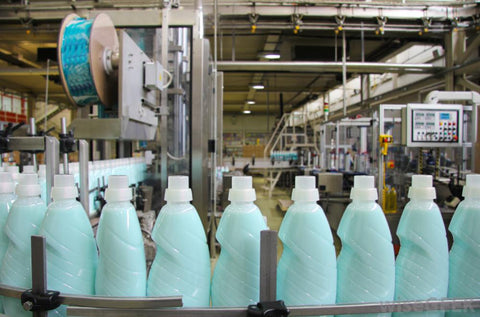
9. Launder with Soapnuts. They're organic, eco-friendly, cost-efficient, and they actually work! Soapnuts are one of my favorite discoveries. While they're a newer trend in the states, they've been used to clean clothes and make cleaning products for centuries in India. Check out this post to learn more. Bonus: Take it one step further and use wool dryer balls instead of dryer sheets, which are made of polyester and toxic fragrances.
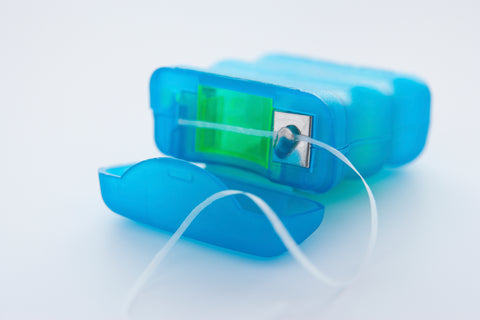
10. Green Your Gums! Floss is typically packaged in plastic containers and made of nylon, which like plastic is derived from crude oil. It's also hard to recycle because it's too small to be processed by most recycling centers and gets caught in the machinery. Tip: While there are a lot of "eco-friendly" flosses on the market now, they are not created equally. To make compostable silk floss, for instance, silkworms are boiled alive in the silk manufacturing process. Many of these are also packaged in plastic materials so it kind of defeats the purpose if you ask me.
I've tried a bunch over the past year and here's my favorite:
- Activated Charcoal Floss. Made with organic bamboo fibers, this floss is 100% biodegradable and comes in a glass jar. It's the first sustainable floss I've found that actually works (i.e., doesn't break while flossing). The only downside is that they don't sell this version in their online store, so I buy it from Amazon. To help ensure it doesn't come in a plastic-lined envelope, I wait to order with larger items.
To stay on top of the latest news and solutions on how to use less plastic, check out this article by National Geographic. For all of my women and mom readers, go one step further with Compostable + Biodegradable Diapers and Biodegradable Organic Tampons. And for all of you shavers out there, try opting for steel razors; they're cheaper and give you a smoother shave.
As Always, Love + Light,
Smita :)
RELATED POSTS YOU MAY ALSO ENJOY
9 Food Trends that Are Destroying the Environment
